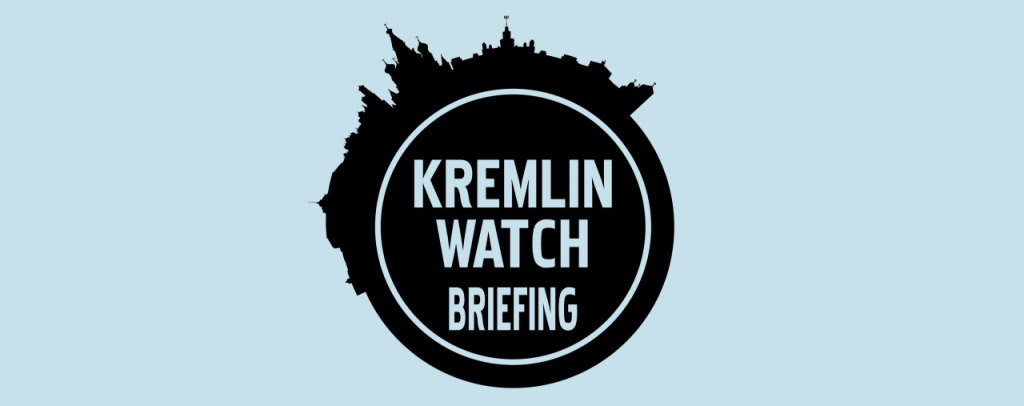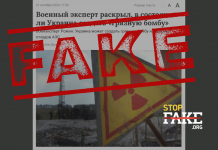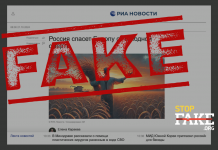
TOPICS OF THE WEEK
Two suspected Russian intelligence agents were caught by Swiss police in Davos last August.
American neo-Nazi leader revealed to have ties to Russia.
Russian coverage of the World Economic Forum.
Good Old Soviet Joke
Question for Radio Yerevan: Is it true that God can become a Party member?
Answer: In principle, yes, but first he would have to leave the Church.
Policy & Research News
Swiss police apprehend two Russian spies in Davos
A BBC report describes how two suspected Russian intelligence agents were caught by Swiss police in Davos last August. Quoting from Tages-Anzeiger, a Swiss newspaper which first broke the story, the BBC report details how the Russian pair, one of whom was posing as a plumber, had diplomatic passports. It is believed they may have been preparing a spying operation targeting the World Economic Forum (WEF). Swiss police have since confirmed to the BBC that two Russians were “checked” in August 2019. The German-language newspaper states the police had become suspicious when they learned that the two Russians had planned to stay for three weeks in the expensive Alpine resort. As the BBC states, Tages-Anzeiger did not name the two suspected agents or specify what kind of spying operation they had reportedly been preparing.
The Russian embassy in Bern told the BBC that the newspaper was just trying to “whip out a scandal out of nothing” and wanted to catch “a popularity wave”. But, this is not the first-time Russian men have been arrested on suspicion of spying in Switzerland. A similar incident happened in 2018 at a Swiss laboratory who were investigating the poisoning of Sergei Skripal. Furthermore, as the BBC states, Bill Browder, a high-profile critic of Russian President Vladimir Putin, told Reuters the Swiss security service had foiled a Russian operation that targeted him last year.
How to Fake Friends and Influence People
Der Spiegel reporters have uncovered a large network of Facebook profiles. Working with the Digital Forensic Research Lab (DFRLab), they were able to identify profiles from over 30 countries that communicate in many languages. The profiles originate from Germany, the United States, France and Russia. Although difficult to detect at first, none of the profiles was real. Over a period of several months, 330 profiles were identified and their actions analyzed.
The network uncovered by Der Spiegel has been active since at least 2011. Many of the accounts include a wealth of detailed biographical information, including résumés and employers. Most of the fictitious personalities purport to work for the military or law enforcement agencies.
The individuals in the fake profiles seem genuine for they appear to maintain social relationships with one another. As in real life, the relationships and conversations can be marked by jealousy, mental illness, strokes of fate, but also great personal successes. However, the network’s real power comes through its contacts with genuine Facebook users, as the fake profiles share a hate-filled agenda and disseminate racist posts, while at the same time venerate people like Vladimir Putin and Donald Trump.
Moreover, figures such as Angela Merkel, Barack Obama and Emmanuel Macron are among the declared enemies. Merkel was depicted with blood on her hands and disparaged as a murderer. Furthermore, the fake profiles hail Russia’s president as “great tsar Vladimir,” whom they portray as being an exemplary statesman and the man who took down Islamic State.
The network has now been stopped. Following a tip-off from Der Spiegel (and DFRLab), Facebooks took action and shut down the accounts associated with the network. However, as Der Spiegel warns the number of fake profiles on Facebook is still likely to continue growing, and their quality is improving.
US Developments
American neo-Nazi leader revealed to have ties to Russia
Rinaldo Nazzaro has been identified as the leader of the American neo-Nazi terror network Base, which is named after the English translation of Al-Qaeda. The Base group is on the FBI terrorist watch list for being a “racially motivated violent extremist group” that “seeks to accelerate the downfall of the US government, incite a race war, and establish a white ethnostate.” Research into Nazzaro’s background has revealed many ties to Russia. Nazzaro leads the Base from his home in St. Petersburg, where he lives with his Russian wife. An ex-intelligence worker, Nazzaro has visited Russian government security events in Moscow and is also “believed by some agencies to be working for the Russian government.” In Nazzaro’s Youtube videos, he has been wearing a Putin t-shirt while promoting his idea of a white homeland in the US.
2015 disinformation operation a factor behind Trump’s impeachment
The ground for President Trump’s impeachment was laid by Russia already in 2015 when Russia Today started a narrative that the Ukrainian government was secretly trying to get Hillary Clinton elected. This narrative was further supported by Russia’s Foreign Ministry in 2016 when the Ministry told journalists about Ukraine’s alleged scheme to get Clinton elected. At the same time, Russia also started promoting a conspiracy theory about how Clinton and the Ukrainians were behind the Democratic National Committee hack. These contradictory narratives were ultimately both behind Trump’s effort to get information about Clinton’s emails and Hunter Biden’s business activities from the Ukrainian government.
Kremlin’s Current Narrative
The Heavyweight Championship of Climate Change
Last week the World Economic Forum 2020 took place in Davos, Switzerland and it has once again attracted criticism for the nature of the event described as “a club for capitalism’s elites.”
The coverage of the event in Russian state media corroborated with this assessment but took it one step further, labelling the meeting of world leaders, activists and business elites as “the one percent gathering in Davos for their annual celebration of being wealthy.” However, the gathering was not without merit, the Kremlin reports – the demands of “the filthy rich […] to be entertained” were fulfilled with the “heavyweight championship” match between President Trump and Greta Thunberg. According to the Kremlin’s narrative, the winner of the match is clear and it is Donald Trump whose optimism is a reason good enough to have “nothing to worry about” in regard to climate change, while Greta Thunberg’s call for “real zero” carbon emissions was ridiculed.
However, if “top end entertainment in the Swiss mountains” was not interesting enough, the World Economic Forum needed another way to “spice up a snoozy meeting” and it was once again allegations of Russian espionage spread by “conspiracy-mongers and attention-hungry media.” However, the story of suspected Russian spies, first published in the Swiss daily Tages Anzeiger, was hardly a “scandal” until the Kremlin’s own media suggested it was – an attempt to once again stress the theme of others demonizing Moscow through allegedly unfounded “conspiracy fantasies.”
Kremlin Watch Reading Suggestion
Russia’s Hostile Measures – Combating Russian Gray Zone Aggression Against NATO in the Contact, Blunt, and Surge Layers of Competition
By RAND Corporation
In its most recent comprehensive research report, RAND analyses the threat posed by Russia’s hostile measures and how NATO can benefit from exploring their strategic shortfalls. All of the many hostile interactions between the West and Russia so far have taken place in the so-called grey zone short of war. This zone entails hostile measures such as diplomatic aggression, intelligence operations, proxy conflicts, assassinations, economic sabotage, political subversion, disinformation and the limited use of the direct military intervention. Russia’s continued use of such tactics aims to deter what it perceives to be NATO’s three goals towards the Kremlin: 1. western encroachment, 2. disruption of the stability of allied governments, and 3. internal revolt. As NATO expands, Russia’s threat perception increases along with the hostile measures, making the grey zone an enduring challenge for NATO’s cohesion and stability.
RAND’s case analysis, however, shows that even though it is not possible to predict which tactical measures Russia will employ in prospective hostile operations, it is feasible to forecast Russia’s broad approach and patterns of operation. Taking in consideration Russia’s three main security concerns, the authors argue that if a nation poses a threat in one of those ways, and fails to deter or prevent Russian hostile measures, then Russia is likely to use hostile measures aggressively against that state. In order to deter those measures, it is the author’s position that NATO should enhance its forward military posture.
Unlike leaders in NATO states, the Kremlin is not conflicted nor restrained by democratic constraints or humanitarian concerns. This allowed Russia to develop deeply institutionalized and highly expert hostile-measures capabilities. These measures destabilise NATO and present an enduring challenge for the alliance. However, Moscow’s efforts are strategically short-sighted and allow for forecasting. NATO can use this advantage to counter Russia beyond measures in the grey zone, including high-order conventional and nuclear scenarios. Forward-stationed multinational units on secure military bases would signal strength, commitment and NATO’s advantage in terms of resources, serving the dual purpose of deterring both hostile measures as well as conventional and nuclear attacks.
Kremlin Watch is a strategic program of the European Values Center for Security Policy, which aims to expose and confront instruments of Russian influence and disinformation operations focused against the liberal-democratic system.





